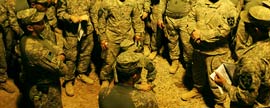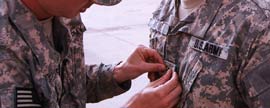Soldiers sometimes have issues that they believe are not being properly addressed by their chain of command. Usually this is the result of a lack of understanding or poor communication between leaders and Soldiers. So the question becomes how does the Soldier attempt to resolve the issue?
Start at the bottom and work your way up
The answer is usually very simple. Talk to your chain of command. In most cases the issue is the result of a simple misunderstanding and open communication can usually resolve the problem. Handling the problem at the lowest possible level usually ensures the best possible result. In cases where the Soldier is uncomfortable speaking with a member of the chain of command they can always move up the chain of command. In doing so, the Soldier will eventually find a member of the chain of command that is removed from the situation and will examine the issue from a professional perspective.
What if I can’t talk to my chain of command about the issue?
When communications have totally broken down and for whatever reason the Soldier does not feel that they can speak with anyone in the chain of command they have several options to include: Commanders open door policy (this is usually available at every level of command),IG, Chaplain, JAG, and by writing their congressmen. A Soldier choosing to go outside their chain of command should also realize that by doing so they are asking a third party to approach the command regarding their problem. This means that the same people in the chain of command that the Soldier should have spoken to in the first place will be addressing or resolving the problem.
If the Soldier properly used the chain of command prior to contacting an external agency it usually looks better for the Soldier, because they have exhausted all means at their disposal before going outside the unit. If a Soldier does not utilize their chain of command prior to going to an external agency it could be an indicator of several issues including: a lack of trust in the chain of command (founded or unfounded), the chain of command at some level has given the Soldier reason to believe they will not be treated fairly, the Soldier’s issues have been adequately addressed by the command but not to the Soldier’s satisfaction, or the Soldier has an issue that was not properly addressed.
It is never easy to solve a problem when communications and trust have broken down. Even if the situation is adequately addressed the root cause of the issue (lack of trust) is usually not addressed and therefore problems usually continue to some degree until someone rotates out. I personally believe that most Soldiers are more professional than this but we are all human and as such have our flaws.
If you have a problem here are a few suggestions:
1. Write down what you issue is, list the facts, ensure you can support your facts and your arguments.
2. Write down several courses of action that you would like to see taken in order to resolve the issue to your satisfaction.
3. Be professional and unemotional. If you are professional it usually goes along way in helping you make your point.
4. Speak with your first line leader to request resolution of the issue. Document this conversation in the form of a memorandum for record. Keep this for your personal records and do not discuss it with anyone. It should contain the time, date, location of the meeting a brief summary of the meeting and anyone that had knowledge of the meeting or attended the meeting.
5. If the problem is not resolved move to the next level of the chain of command using the information in item 3. Continue this action until you have reached the company or battalion commander level.
6. If you still have not received satisfaction and believe your issue is not being properly addressed consider speaking with the IG from an information perspective. This means you can speak to the IG to understand if the chain of command has acted appropriately. If so the conversation is most likely over. If it appears the chain of command may have acted improperly you have two choices.
a. Approach the command with the additional information you discovered in conversation with the IG and ask for reconsideration.
b. Ask the IG to approach your chain of command in an attempt to resolve the issue.
Note: you should document step 5 in the same manner described in step 3
The Aftermath
These steps are usually enough to solve an issue. In some cases Soldier may feel that have received retaliation for trying to resolve an issue. Therefore it is important for Soldiers to keep proper documentation of events as they happen. If a Soldier begins to receive counseling statements for minor violations after reporting an issue or is treated differently than another Soldier for the same infraction this could be an indicator. Anytime you are given a formal counseling or other documentation you should request a copy of the document. If the individual refuses to provide a copy of document you requested, you should record the incident as stated in step 3 above. If you receive verbal reprimands document them per step 3. Documentation allows you to show a time line coupled with details that may assist you during an external review.
Any documentation made by the Soldier should be done from a professional perspective to document the facts of the situation. This documentation should not be used to keep records on unit leaders. Recording information in a manner that is unprofessional is counterproductive to resolving your issue.
I believe that 98% of the time the chain of command wants to do what is right. 2% of the time a leader may make a poor decision and have difficulty admitting it. In these cases someone in the chain of command has the intestinal fortitude to set things right.














